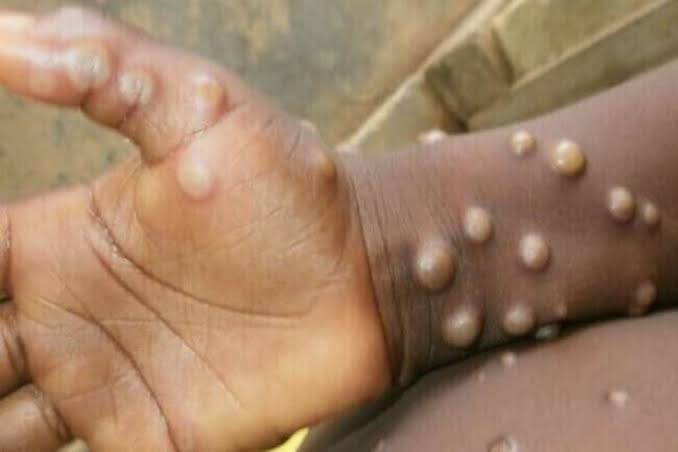Origin, treatment… what you should know about monkeypox

By Genevieve Aningo
On July 23, the World Health Organisation (WHO) declared monkeypox outbreak a public health emergency amid surging cases of the disease across the globe.
Nigeria is one of the countries grappling with the outbreak of the disease.
According to the Nigeria Centre for Disease Control (NCDC), since the emergence of monkeypox in the country in September 2017 to July 24th 2022, it has recorded a total of 869 suspected cases across 35 states out of 36. However, out of the suspected cases, 359 cases are confirmed.
The report detailed male gender accounts for 237 cases and female make up122 victims. Also, 11 deaths have been recorded. They are Lagos (3), Edo (2), Imo (1), Cross River (1), Abuja (1), Rivers (1), Ondo (1), and Delta(1).
The upsurge in the number of Monkeypox victims influenced the Nigeria Disease Control and Prevention (NCDC) on May 26th to activate a Monkeypox (MPX-EOC) National Emergency Operations Centre to respond to the risk assessment and improve the coordination of responses across the country. Nigeria has been found to be at a high risk of the Zoonotic (from animal to human) disease.
Origin
Monkeypox is a zoonotic disease that can be transferred from animals to humans. It is a virus that belongs to the Orthopoxvirus genus of the Poxviridae family. Monkeypox is caused by the monkeypox virus.
There are two variants of the illness: the central African clade or congo basin clade and the west African clade. The former is the most severe. Monkeypox infections are similar to smallpox symptoms but with less complications. Monkeypox is rarely fatal, it’s more of a self-limiting illness.
According to World Health Organization (WHO), monkeypox illness was first discovered at Basin, in Democratic Republic of the Congo in 1970.according to WHO, this was through a 9-months old boy in a region where smallpox had been eliminated in 1968 and this spread through the rest of Africa, particularly Central and West. Notwithstanding, the monkeypox victims are now found in other parts of continents.
For example, WHO reported that 42 of her member countries are ridden with the infection. They are Cameroon, Central African Republic, Congo, Democratic Republic of the Congo, Ghana, Nigeria, Argentina, Brazil, Canada, Mexico, United States of America, Venezuela, Morocco, United Arab Emirates, Austria, Belgium, Czechia, Denmark, Finland, France, Georgia, Germany, Greece, Hungary, Iceland, Ireland, Israel, Italy, Latvia, Malta, Netherlands, Norway, Poland, Portugal, Romania, Slovenia, Spain, Sweden, Switzerland, the United Kingdom, and Australia.
Causes/ risk
The primary trigger of monkeypox infection is through animal transmission, a direct contact of either the blood or fluid of an infected animal. Animals such as squirrels, tree squirrels, Gambian pouched rats, dormice non-human primates are the carriers of monkeypox illness.
Contact with infected animals can happen through eating improperly cooked animal meat and fluid and blood residue. Rodents and non-human primates are also suspected to be a carrier of the virus.
Human to human transmission is through contact of all sorts. This can be droplets of respiratory particles on surfaces, spittle splash, touch, mouth to mouth, face to face, mouth to skin, beddings, sharing of personal belongings and even the most recent discovery sexual intercourse among gay men. Transmission can also occur between a mother and her child during birth via the placenta. This is known as congenial monkeypox.
Monkeypox shares similar symptoms with smallpox. During the time of infection, the patient is laden with all symptoms lasting from 2 to 4 weeks before cured. symptoms of the virus include headache, fever, rash, back pain and at the fifth day of incubation the rashes transform into swollen lymph nodes filled with white fluid. Patients may also experience pimples, blisters or ulcers on the face, body and sexual organs.
Prevention and cure
For monkeypox infection, the cure is more therapeutic because there is no distinctive treatment yet. Treatment is enhanced through over the counter medications for symptomatic care and eating well fruits, vegetables and nuts to boost the immune system to recover rapidly. The only medication available is the Tecovirimat which is in the United States of America and used in severe conditions.
Vaccination is also an option to fight against contacting the monkeypox virus. There are two vaccines namely the JYNNEOS(Imvanex) and ACAM2000.
Prevention is still the best option by awareness, maintaining personal hygiene, avoid sharing of personal belongings, cooking animal protein properly and limiting sexual partners especially gay people.

